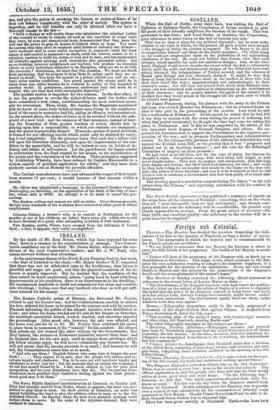SCOTLAND.
When the Earl of Derby, some days back, was visiting the Earl of Eglinton at Eglinton Castle, the Corporation of Irvine resolved to give the guest of their friendly neighbour the freedom of the burgh. This was presented in due form; and Lord Derby, in thanking the Corporation, gave utterance to some views on the war of interest just now. That was no time or place for any political discussion, but ho must make allusion to one topic in which, for the present, all party politics were merged —the struggle in which the country is engaged. He was happy to be able to congratulate himself and them on the recent successes; but, while doing so, he could not congratulate them on the probability of any approaching conclusion of the war. He could not believe that Russia, even after such reverses, would speedily lay aside her ambitious designs ; and, on the other hand, England would never sheathe the sword which she had so reluctantly drawn until the noble and disinterested designs of the Allies had been com- pletely obtained, the independence of Turkey secured, and the schemes of Russia upon Europe and Asia effectually checked. It might be true that those at home had not such a direct share in the conflict as those who had shed their blood like water, unmurmuring) y and unhesitatingly, in their country's cause ; but still they had poured forth freely their financial trea- sures, and had submitted with readiness to obstruotione in .the development of their resources ; and he greatly mistook the spirit of the country if he doubted that they would persist in the struggle till the great ends to which he alluded were gained.
Sir James Fergusson, during his absence with the army in the Crimea last year, was elected Member for Kilmarnock ; but he returned home in time to take part in the proceedings of the session. Last week he met his constituents at Kilmarnock. In his speech he stated that he had felt it his duty to remain with the army during the period of suffering, but when that period terminated, he thought the time had come for taking his place in Parliament : and in this he was supported by the advice of the late lamented Lord Raglan, of General Simpson, and others. He ex- pressed his determination to support the Government in the vigorous pro- secution of the war ; and to promote Parliamentary and Administrative reform. In the retrospective portions of his address he defended his vote against the Turkish Loan Bill, on the ground that it was " proposed and carried out in an insulting manner" ; and his vote for the Sebastopol Committee of inquiry on these grounds—
He had voted as he did then, not for the sake of party, but because he thought it right. Our gallant army, with their allies, had fought as men never fought before. They had, by neglect and carelessness, died like dogs from disease and famine, and their blood had manured the land ; and could he then help voting for an inquiry that would fix the blame on the true cul- prit—the author of those disasters ; and was it to be wondered at that he had given a vote to condemn a Government that had been guilty of so much mis- management. The meeting passed a resolution congratulating Sir James " on his safe return from the Crimea," and expressing satisfaction with his conduct in Parliament.
The North British. Agriculturist has published a summary of reports on the crops from all the counties of Scotland ; remarking, that on the whole they are " more favourable than we had anticipated ; and, though com- pared with last year the deficiency will be considerable, the present crop closely approaches an average. From the great extent of potatoes—the large yield, and excellent quality—the deficiency in the cereals will in a great measure be supplied."


























 Previous page
Previous page